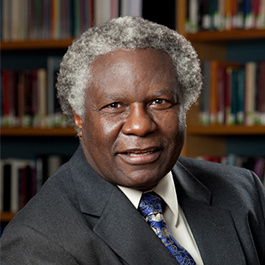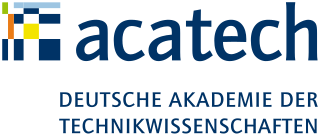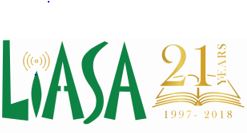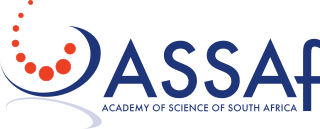Related Research Articles
A national academy is an organizational body, usually operating with state financial support and approval, that co-ordinates scholarly research activities and standards for academic disciplines, and serve as public policy advisors, research institutes, think tanks, and public administration consultants for governments or on issues of public importance, most frequently in the sciences but also in the humanities. Typically the country's learned societies in individual disciplines will liaise with or be coordinated by the national academy. National academies play an important organisational role in academic exchanges and collaborations between countries.

The African Academy of Sciences (AAS) is a non-aligned, non-political, not-for-profit, pan-African learned society formed in 1985.

Calestous Juma was a Kenyan scientist and academic, specializing in sustainable development. He was named one of the most influential 100 Africans in 2012, 2013 and 2014 by the New African magazine. He was Professor of the Practice of International Development and Faculty Chair of the Innovation for Economic Development Executive Program at Harvard Kennedy School. Juma was Director of the School's Science, Technology and Globalization Project at Harvard Kennedy School as well as the Agricultural Innovation in Africa Project funded by the Bill and Melinda Gates Foundation.

Mark James Mwandosya is a Tanzanian CCM retired politician and a former Member of Parliament for Rungwe East constituency, who is currently serving as the chairman of the Board of Directors of Ewura Tanzania and the chairperson of the Energy Regulators Association of East Africa Annual General Assembly.

Rajagopala Chidambaram is an Indian Physicist who is known for his integral role in India's nuclear weapons program; he coordinated test preparation for the Pokhran-I (1975) and Pokhran-II (1998).

Atta-ur-Rahman, h-index 75, with 36,000 citations is a Pakistani organic chemist and is currently serving as Professor Emeritus at the International Center for Chemical and Biological Sciences at the University of Karachi and as Chairman of PM Task Force on Science and Technology. He has twice served as the President of Pakistan Academy of Sciences. He was the Federal Minister of Science and Technology (2000-2002), Federal Minister of Education (2002) and Chairman Higher Education Commission with status of Federal Minister (2002-2008) He is also the President of the Network of Academies of Sciences in Countries of the Organisation of Islamic Countries (NASIC). After returning to Pakistan from Cambridge after completing his tenure as Fellow of Kings College, Cambridge University, he contributed to the development of the International Center for Chemical and Biological Sciences at the University of Karachi, and transforming the landscape of higher education, science and technology of Pakistan. He is Fellow of Royal Society (London), Life Fellow of Kings College, Cambridge University, UK.,, Academician Chinese Academy of Sciences and Professor Emeritus at University of Karachi

Acatech, founded in 2002 and established as the German Academy of Science and Engineering on 1 January 2008, represents the interests of German technical sciences independently, in self-determination and guided by the common good, at home and abroad. acatech is organized as a working academy that advises politicians and the public on forward-looking issues concerning the technical sciences and technology politics. The academy sees itself as an institution that provides neutral, fact and science-based assessments of technology-related questions and serves society with far-sighted recommendations of excellent quality. Also, acatech aims to facilitate the knowledge transfer between science and business and to promote new talent in the technical sciences. To further the acceptance of technical progress in Germany and demonstrate the potential of forward-looking technologies for the economy and for society, acatech organizes symposia, forums, panel discussions and workshops. acatech communicates with the public by publishing studies, recommendations and issue papers.

The Library and Information Association of South Africa (LIASA) is a professional non-profit organization, representing institutions and people working in libraries and information services. The LIASA National Office is located on the Pretoria campus of the National Library of South Africa (NLSA).

The Academy of Science of South Africa (ASSAf) is the national science academy in South Africa. It was started in 1996, and encompasses all fields of scientific work. Its legal foundation is the Academy of Science of South Africa Act, Act 67 of 2001, which came into operation in May 2002.

Mohamed Hag Ali Hag el HassanOMRI GCONMC FAAS FIAS FTWAS is a Sudanese-Italian mathematician and physicist who co-founded numerous scientific councils. He is the President of The World Academy of Sciences and Sudanese National Academy of Sciences.

The Council for Scientific and Industrial Research (CSIR) was established by NLC Decree 293 of October 10, 1968 amended by NLCD 329 of 1969, and re-established in its present form by CSIR Act 521 on November 26, 1996. The genesis of the council however, dates back to the erstwhile National Research Council (NRC), which was established by the government in August 1958 to organize and coordinate scientific research in Ghana. In 1963, the NRC merged with the former Ghana Academy of Sciences, a statutory learned society. Following a review in 1966, the academy was reconstituted into, essentially, its original component bodies, namely a national research organization redesignated the CSIR and a learned Society, designated the Ghana Academy of Arts and Sciences.
Edward Solomon Ayensu was an African life scientist and Professor. He was an international development advisor on science, technology and economic development. He was a founding Fellow of the African Academy of Sciences.
Science and technology is Jordan's growing economic sector. This growth is occurring across multiple industries, including information and communications technology (ICT), solar and wind energy and nuclear technology.

Bettine van Vuuren is the Registrar and a Member of the Executive at the University of Johannesburg. She is also a Professor of Zoology and Director of the Centre for Ecological Genomics and Wildlife Conservation at the University of Johannesburg.
Ebenezer Laing, was a Ghanaian botanist and geneticist who served as the Pro-Vice Chancellor of the University of Ghana, Legon. He was a professor at the University of Ghana, Legon, and later an emeritus professor. Laing, together with his university and faculty colleague, George C. Clerk (1931–2019), was one of the first Ghanaian academics to specialise in botany as a scientific discipline and contributed significantly to the growth of the field in Ghana. He was also a Fellow of the Ghana Academy of Arts and Sciences, inducted in 1965. In 1985, he was elected an inaugural Fellow of the African Academy of Sciences.
Priscilla Baker is a professor of analytical chemistry at the University of the Western Cape. She is the co-leader of SensorLab, a research platform in electrochemistry that deals with the electrodynamics of materials and sensors. She is an active member of the Academy of Science of South Africa, European Scientific Network for Artificial Muscles (ESNAM) and the Marie Curie International staff exchange scheme (IRSES).

Irvy (Igle) Gledhill is a South African physicist at the University of Witwatersrand, School of Mechanical, Industrial & Aeronautical Engineering, in Johannesburg.

Dame Fiona Elizabeth Murray is the Associate Dean for Innovation at the MIT Sloan School of Management. She is a member of the Prime Minister of the United Kingdom's Council for Science and Technology and Vice-Chair of the Board of Directors of the NATO Innovation Fund.
Malik Maaza, also written as Mâaza, is an African physicist and UNESCO Chair in Nanosciences and Nanotechnology. He has made significant contributions to the field of physics, particularly in nanosciences and nanotechnology. Maaza has received several prestigious awards, including the Order of Mapungubwe and the Spirit of Abdus Salam Award, and recognition from the World Cultural Council for his contributions to education and research in physics.
The Kenya National Academy of Sciences (KNAS) is an independent academic institution, founded on 2 November 1983. KNAS collaborates with the Government of Kenya, scientific organisations, the scientific community, and the public to promote the use of scholarly and scientific knowledge and technology for national development. KNAS encompasses all scientific disciplines, including humanities and technology. It is associated with the International Science Council, the InterAcademy Partnership, and the Network of African Science Academies.
References
- 1 2 3 4 5 6 7 8 9 10 "Zambia Academy of Sciences - InterAcademy Partnership" . Retrieved 29 December 2023.
- 1 2 3 4 5 6 7 8 9 10 "Zambia, Zambia Academy of Sciences (ZaAS) - International Science Council" . Retrieved 29 December 2023.
- 1 2 "Zambian science academy launched". SciDev.Net. 16 September 2005. Retrieved 29 December 2023.
- ↑ "Managing COVID19 pandemic in Africa" (PDF). Retrieved 29 December 2023.
- ↑ "Zambia Academy of Sciences Act, 2020 – Laws.Africa". commons.laws.africa. 18 December 2020. Retrieved 29 December 2023.
- ↑ "ZAMBIA ACADEMY OF SCIENCES BILL, N.A.B. NO. 17 OF 2020" (PDF). Retrieved 29 December 2023.